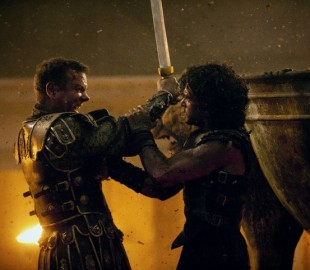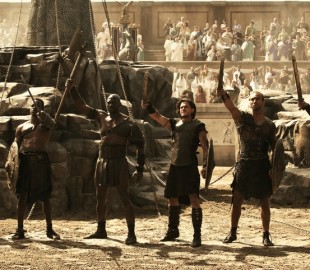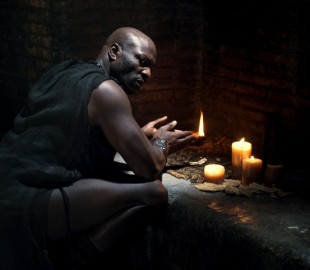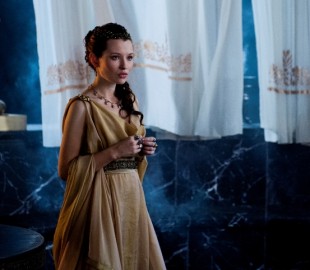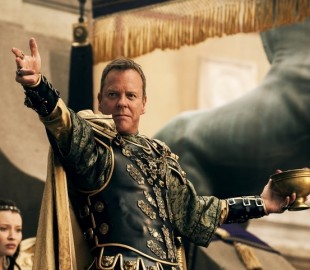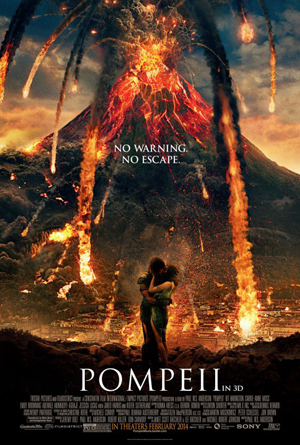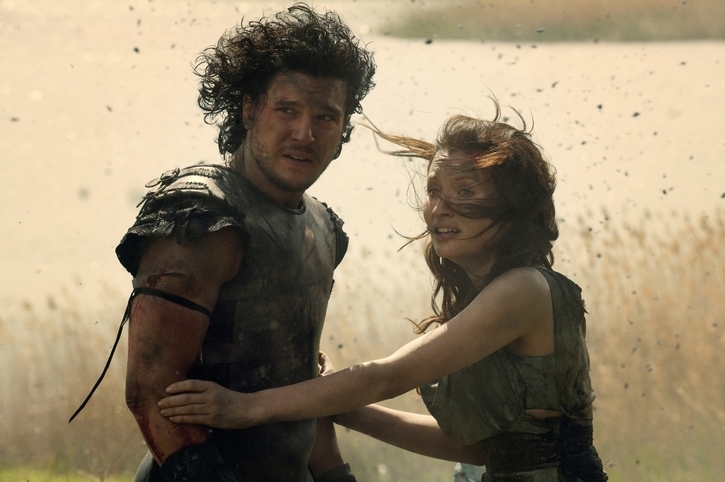
Fiery Pompeii a Volcanic Star-Crossed Love Story
For a disaster movie, based on an actual historical event, no less, Pompeii is remarkably restrained. For a gladiator-slash-revenge-slash-star-crossed-lovers-love-story directed by the man behind Resident Evil, Event Horizon, Alien vs. Predator and Mortal Kombat, Paul W.S. Anderson, it is shockingly even more so. Sure it is in 3-D. Of course the CGI visual effects threaten to overwhelm the proceedings.
Without question a few of the performances, I’m looking at you, a supremely miscast Kiefer Sutherland, are hyperbolically comical and hysterically over the top. But, stunningly, surprisingly, almost to the point of dumfounded disbelief, the movie doesn’t try to do too much or overplay its hand, and if not for a hackneyed, unintentionally silly conclusion the film comes curiously close to being worthy of a somewhat half-hearted recommendation.
Sadly, the last 15 minutes, the point when all you-know-what breaks loose and it’s every citizen for themselves, is Anderson at his absolute worst, the director engaging in many of the overly theatric, exceedingly melodramatic tricks that have undone just about every single motion picture he has ever made. He’s a B-movie wunderkind with aspirations of becoming an A-list auteur, and while the material moderately lends itself to the latter his sensibilities behind the camera always seem to provoke the former to come oozing out of him come what may.
You can think of the movie as some odd-duck assemblage of Gladiator, 2012, Dante’s Peak and Titanic thrown into a blender and mixed with devilish relish. The story, credited to three writers (with an uncredited assist by “Downton Abby” and Gosford Park scribe Julian Fellowes), is a silly hodgepodge of a number of clichés yet the majority of the dramatics are reasonably better developed than initially surmised. I was more invested in the proceedings than I had any right to be, the more intimate moments affecting an authentic emotional reaction I couldn’t have anticipated.
The plot itself is pure cheese. Milo (Kit Harington), the sole survivor of his tribe of Briton horse lords, has been raised a slave since childhood and taught the gladiatorial arts by his owner. He is sent to Pompeii to take part in an annual festival, his skills appearing to be a solid match for reigning champion Atticus (Adewale Akinnuoye-Agbaje), the wise barbarian one win away from achieving his freedom.
While there Milo comes into contact with the beautiful Cassia (Emily Browning), daughter of the city’s wealthiest merchant Severus (Jared Harris). He is also reunited with the Roman General turned corrupt Senator, the malevolent Corvus (Kiefer Sutherland), who was responsible for the slaughter of his entire clan. With friendship developing between he and Atticus, love in the air as it relates to Cassia and vengeance building every time he looks upon Corvus, Pompeii’s beautiful mountain Mount Vesuvius is rumbling to life, unimaginable mayhem and tragedy on the docket no one in the city is prepared to face.
The love story between Milo and Cassia is pretty silly yet still works better than it has any right to, while Harris and co-star Carrie-Anne Moss, playing his strong-willed wife Aurelia, add a little gravitas to the proceedings I found nice. As for the build up to the eruption itself, Anderson handles it all nicely, and while he doesn’t stray far from the standard Irwin Allen playbook (he was the man behind The Poseidon Adventure, The Towering Inferno and a slew of ‘70s disaster epics) he still gives it enough of his own idiosyncratic spin to keep things interesting.
But the real reason to watch is Akinnuoye-Agbaje. He’s an actor who has deserved better for some time (just look at his wonderfully nuanced work in the short-lived British action series “Hunted” for proof), nonsense roles in Thor: The Dark World, The Thing and G.I. Joe: The Rise of Cobra, just to name three, not exactly making the most of his talents. He gives Atticus real weight, true heft, mining territories and exploring nuances that the script barely hints at. His moments have an authority to them nothing else in the movie can touch, making his penultimate bout against Corvus’ second-in-command Proculus (Sasha Roiz) and his final actions post-eruption memorably rousing and tragically moving in ways so much of the rest of the movie simply is not.
If only those final 15 or so minutes weren’t such, please excuse the wording, a disaster. Anderson throws logic (what there is of it; this genre isn’t exactly known for its practical applications of little things like physics, continuity or scientific realism) completely out the window, the final sequences an implausible hodgepodge of stupidity and cartoonish buffoonery that blew my mind. Horses have the magical ability to outrun unmitigated chaos, splinters of wood in the hands of a girlish neophyte can pick to most complex of locks and fleeing survivors pause to pick pointless fights making any chance of survival close to impossible.
Admittedly, it all ends as it must, on that front I give Anderson and his team credit, but the staging coupled with the maudlin theatricality of the presentation of the climactic gestures is too much to bear, the snickering and giggling heard throughout the theatre as the screen faded to black not exactly intentional. Pompeii is better than it has any right to be, especially considering the director’s track record, but that just makes its descent into lunacy, madness and melodramatic excess all the more off-putting, the movie sadly nothing more than a volcanic disappointment that lays waste to almost all of its more laudable and celebratory properties.
– Review reprinted courtesy of the SGN in Seattle
Film Rating: 2 (out of 4)


